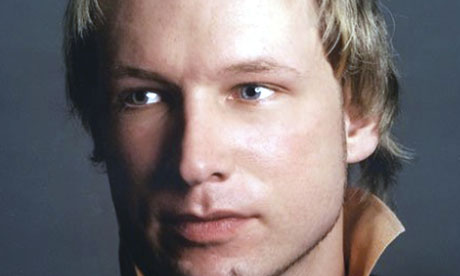Anders Behring Breivik has confessed to Oslo bombing and Utøya island shootings but denies criminal responsibility
- guardian.co.uk,

The man charged with the twin terror attacks that killed at least 93 people in Norway on Friday is expected to plead not guilty when he appears in court on Monday despite telling his lawyer the atrocities had been "gruesome but necessary".
Anders Behring Breivik has confessed to the bombing in Oslo and the mass shooting at a youth camp on Utøya island, but denied criminal responsibility. He said he wanted to start a revolution in Norwegian society to defeat liberal immigration policies and the spread of Islam.
"He thought it was gruesome having to commit these acts, but in his head they were necessary," Breivik's lawyer, Geir Lippestad, told the Norwegian broadcaster NRK.
After detonating the bomb that killed seven in downtown Oslo, Breivik embarked on a shooting spree at a summer youth camp on Utøya island, killing at least 86, the biggest massacre by a single gunman in modern times. Police say he still had a "significant amount" of ammunition when arrested.
Although Breivik told officers he had acted alone, Norwegian police are investigating whether he received help during the attacks. Surgeons, meanwhile, confirmed he used "dum-dum" bullets designed to disintegrate inside the body and cause maximum internal damage.
Oslo's acting police chief, Sveinung Sponheim, said they were investigating witness statements from the island that spoke of more than one gunman.
A Norwegian investigator added: "Our priority at the moment is to establish whether he [Breivik] operated alone."
Counter-terrorism police raided a flat owned by Breivik in eastern Osloon Sunday and arrested six people. They were released without charge.
As more details emerged of Breivik's possible affiliations with British extremists, the authorities were investigating whether he had travelled to London to plot his rightwing "crusade".
European security sources confirmed they were investigating claims that Breivik and other far-right individuals attended the inaugural meeting of the far-right Knights Templar group in London in 2002. They said there had been increased internet chatter from individuals claiming they belonged to the Knights Templar, an organisation referred to by Breivik in a 1,500-page manifesto published online hours before he began his killing spree.
The admission from Breivik in the manifesto that he had been planning the attacks since 2009 has raised concerns over the intelligence capabilities of the Norwegian authorities. In the manifesto he expresses surprise that he has not been "flagged up" for suspicious activities.
Security officials have refused to confirm they were aware of Breivik as a potential threat, although publicly there is little to indicate he was on any watchlist. His only criminal record appears to be a traffic conviction 10 years ago. Other questions over the police response to the massacre remain unanswered after officers confirmed an hour elapsed between being alerted and stopping the massacre.
Erik Berga, police operations chief in Buskerud County, said an inadequate boat and a decision to await a special armed unit from Oslo, 30 miles (45km) away, hampered the response. "When so many people and equipment were put into it, the boat started to take on water, so that the motor stopped," she said.
On Sunday it emerged that a police officer had been guarding the island but it is thought he was killed by the gunman.
Breivik's father, Jens, said he had learned of his son's involvement online. "I was reading the online newspapers and suddenly I saw his name and picture on the net," he told the VG tabloid.
"It was a shock to learn about it. I have not recovered yet," he said. Jens, who is in his 70s, lives in France and has had no contact with his son since 1995, according to Reuters.
The Norway attacks have raised concerns copycat operations may take place in Europe. British Muslim leaders announced on Sunday increased security at mosques. Mohammed Shafiq, the leader of Ramadhan Foundation, one of Britain's largest Muslim groups, says mosques were being extra vigilant.
Shafiq said he was also discussing the need to take extra precautions with other European Muslim leaders, adding that he has spoken to the police about extra protection.
Concerns the UK remains vulnerable to such an attack were aired by the foreign secretary, William Hague, who warned that Britain's security forces may not be able to stop a Norway-style terror attack.
However, security experts said the events in Norway last Friday would refocus how far-right groups are dealt with.
Dr John Bew, director of the International Centre for the Study of Radicalisation and Political Violence at King's College London, admitted there had been a lack of focus on far-right extremism, with research into Islamism often taking precedence. "We have looked at lone wolves in relation to Islamism but I think we haven't taken far-right extremism seriously enough."
James Brandon, research head at London's Quilliam thinktank, said: "The horrific events in Norway are a reminder that white far-right extremism is also a major and possibly growing threat."
Norway is still struggling to come to terms with the attacks, which came within two hours of each other on Friday afternoon. Breivik was arrested after surrendering on the island, where he had shot and killed at least 86 young people at a summer camp run by the ruling Labour Party. Seven civil servants died after he detonated a massive car bomb in Oslo's government district 90 minutes earlier.

Aucun commentaire:
Enregistrer un commentaire